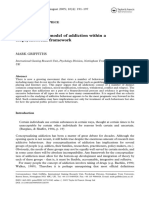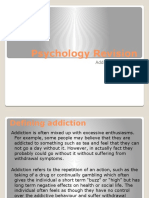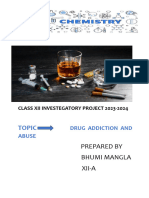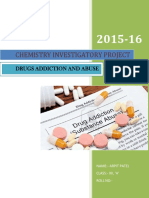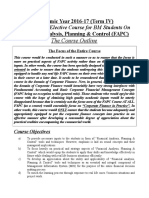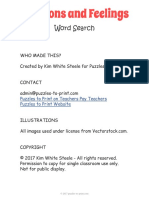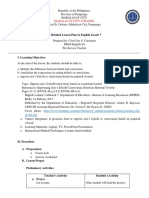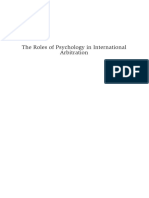CORRESPONDENCE
Nicotine, tobacco and addiction social environment and psychological con-
stitution. To many, this goes without saying,
but others present oversimplistic and parsi-
SIR - For many people, the concept of be seen as a coping strategy (they experi- monious explanations. Behaviorial addic-
addiction involves taking of drugs'; most ence an arousing 'buzz' or a 'high' or a tions do exist, and should be treated no
official definitions of addiction include paradoxically tranquillizing feel of 'escape' differently from the better-known chemi-
drug ingestion. Despite such definitions, or 'numbing'). cally based addictions.
there are many potentially addictive behav- Tolerance: a process whereby increasing Mark Griffiths
iours that do not involve drug ingestion, for amounts of the particular activity are Psychology Division,
example gambling, overeating, sex, exer- required to achieve the former effects. For Nottingham Trent University,
cise, computer-game playing, the Internet, instance, a gambler may have gradually to Nottingham NG1 4BU, UK
pair bonding and work2-'. Such diversity has increase the size of the bet to experience a 1. Rachlin. H. Psycho/. Sci. 1, 294-297 (1990).
led to all-encompassing definitions of what euphoric effect that was initially obtained 2. Miller, W. R. The Addictive Behaviors (Pergamon. Oxford,
19801.
constitutes addictive behaviour. Trying to by a much smaller bet. 3. Orford, J. Excessive Appetites: A Psychological View of
define 'addiction' is rather like defining a Withdrawal symptoms: unpleasant feeling the Addictions (Wiley, Chichester, 1985).
'mountain' or 'tree' in that there is no sin- states and/or physical effects that occur
gle set of criteria that can ever be necessary when the particular activity is discontinued SrR - Although there is little doubt that
or sufficient to define all instances. In or suddenly reduced, for example 'the cigarette smoking is hazardous to health
essence, the whole is easier to recognize shakes', moodiness or irritability. and that nicotine plays a major role in re-
than the parts. Here I suggest six compo- Conflict: conflicts between addicts and inforcing this behaviour 1, we believe that
nents that in my view need to be fulfilled if those around them (interpersonal conflict) certain effects of nicotine itself need to be
a behaviour is to be defined as 'addictive'. or from within the individual (intrapsychic dissociated from tobacco and other drugs
Salience: when the particular activity conflict) that are concerned with the partic- of abuse.
becomes the most important activity in ular activity. Despite recent findings 2 demonstrating
people's lives and dominates their thinking Relapse: the tendency for repeated rever- common neuropharmacological and neuro-
(preoccupations and cognitive distortions), sions to earlier patterns of the particular anatomical similarities between the effects
feelings (cravings) and behaviour ( deterio- activity to recur and for even the most of nicotine and other drugs of abuse,. there
ration of socialized behaviour). For in- extreme patterns typical of the height of are some important differences. For exam-
stance, even if they are not actually the addiction to be quickly restored after ple, nicotine is typically devoid of the pro-
engaged in the behaviour, they will be many years of abstinence or control. found euphoric and perceptual effects
thinking about the next time they will be. I believe that explanations for addiction offered by many drugs of abuse, and there
Mood modification: subjective experiences must come from a biopsychosocial is little evidence that the habitual consump-
that people report as a consequence of approach, in that 'addiction' arises from a tion of nicotine (via tobacco) causes
engaging in the particular activity and can combination of biological predisposition, depression or psychosis3 •
So far. systemS '" the AKTAdesiBJl family ndude:
• AI<TAexp~o<er. for method ~
and sale "" of~ boomoleOJie
• the Ot!W AI<TApunfier: for punficanon of peptJdes.
oitgonucleotxles and other boornolecules
18
© 1996 Nature Publishing Group


